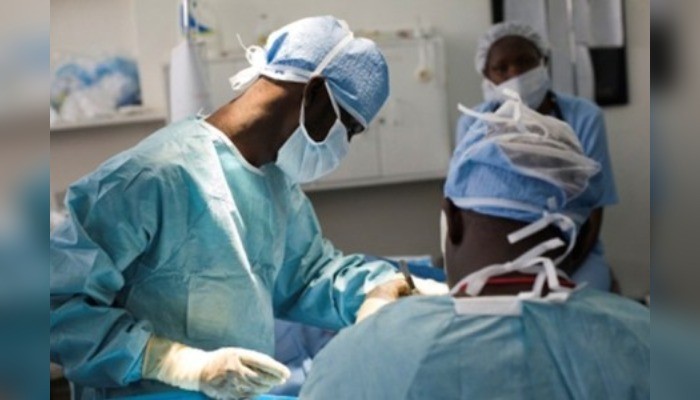The aftermath of Hurricane ‘Japa’ in Nigeria has left a trail of devastation on the nation’s healthcare system as more skilled health professionals continue to emigrate to developed countries where improved working conditions and workers’ welfare are guaranteed.
Medical facilities that were already struggling with limited resources and infrastructure are now further squeezed by the hurricane’s impact, leading to constraints for patients seeking treatment.
The strain on healthcare providers has been immense, with nurses, pharmacists, anaesthetists, and consultants avoiding employment with federal institutions.
About five wards with 150 beds have been closed down at the Lagos University Teaching Hospital (LUTH), Idi-Araba due to a shortage of health workers.
Chris Esezobor, a professor of Paediatrics and Paediatric Nephrology at LUTH, said health professionals are weighing if it’s worth it to remain in Nigeria in the public sector where they cannot be guaranteed good welfare or adequate infrastructure to practice.
In the aftermath of the COVID-19 pandemic, LUTH faced a critical challenge: reopening a renovated ward with 120 beds, but without the necessary manpower to run it.
Despite the hospital’s efforts to recruit nurses, many of those hired never showed up, having already secured employment elsewhere or left the country. This shortage of nurses, coupled with a decline in the number of medical applicants, has painted a bleak picture for LUTH.
A decade ago, LUTH would have been inundated with applications for pediatric positions, with 50 candidates vying for just 10 vacancies, the officer said.
However, the recent pediatric recruitment drive yielded a mere four applicants, and only three of them attended the interview. This trend extends to other specialties as well, including internal medicine, obstetrics and gynecology, and psychiatry.
No fewer than 400 consultant anaesthetists left Nigeria for greener pastures in the last two years, according to the Nigerian Society of Anaesthetists.
Olubusola Alagbe-Briggs said that the immigrant anaesthetists left Nigeria for a better practice environment as they are one of the most sought-after specialists in foreign countries because of the peculiarity of their services.
“There is a global shortage of anaesthetists because of the nature of the intensive, acute, and focused job. We had about 1,200 members in the past, but today we have only 800 members,” he said.
According to the president of the Pharmaceutical Society of Nigeria (PSN), more than 7,000 pharmacists emigrated from Nigeria in the last two years, due to the lack of incentives to practice locally.
“Those countries that are short of anaesthetists are pulling those in Nigeria to their countries. Nigerian professionals are one of the best and are highly sought-after by other countries.”
Over 9,000 medical doctors are left with the Nigerian Association of Resident Doctors (NARD) due to the surging pressure exacted by the brain drain crisis on Nigeria’s healthcare system, Emeka Orji, NARD president, said in the wake of an indefinite strike by the association over unmet demands for improved working conditions.
However, the situation has been further compounded by a wave of misdiagnoses. Many patients have received incorrect diagnoses, leaving them untreated or receiving inappropriate treatment. This has led to a sense of despair among patients and their families, who are already grappling with the trauma of the hurricane.
The hurricane’s impact on the healthcare sector is a stark reminder of the fragility of Nigeria’s health system.
The dwindling pool of medical professionals poses a significant threat to Nigeria’s ability to provide quality healthcare.
The hospital, like other teaching institutions, plays a crucial role in training future doctors and nurses. However, if the current trend of talent drain continues, the country may struggle to fulfil its mission and meet the healthcare needs of the community.
The factors driving this exodus of medical professionals are complex and multifaceted. Many cite better pay and working conditions abroad as primary motivators. Others are drawn to opportunities for professional development and research that may be limited in Nigeria.
Read also: ‘Japa’ wave hits Nigeria’s investment banking industry
Regardless of the reasons, the consequences are clear: Nigeria’s healthcare system is facing a severe shortage of skilled medical personnel.
Analysts say addressing this crisis will require a multi-pronged approach. Investing in healthcare infrastructure, improving training programmes, and enhancing salaries and benefits are essential steps. Additionally, creating a supportive and rewarding work environment can encourage medical professionals to remain in Nigeria and contribute to the country’s healthcare system.
Kay Adesola, national president of the Association of Nigerian Private and Medical Practitioners (ANPMP) and a veteran medical doctor, said the economic hardship has also aided the problem and translated to poor quality of care for patients.
“The government just declared an emergency on food production. We need one in the health sector. We need to look at the works done at the twilight of the last government by the Presidential Health Reform Committee headed by Professor Yemi Osinbajo,” he told BusinessDay earlier.






